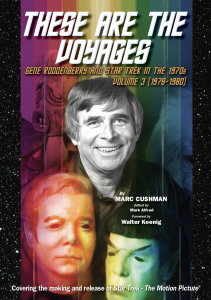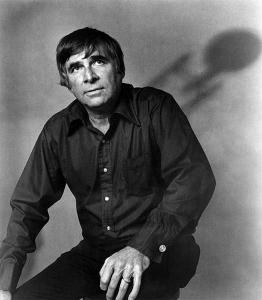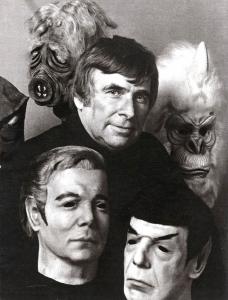Star Trek Creator Gene Roddenberry’s Greatest Battle: Against a Studio!
New book series tells how decade-long effort to bring Star Trek back in 1970s led to many conflicts.
LOS ANGELES, CALIFORNIA, USA, November 10, 2020 /EINPresswire.com/ -- During World War II, future TV writer/producer Gene Roddenberry flew bomber missions over the Pacific. He survived two deadly plane crashes, and later served as a Los Angeles Police Department motorcycle cop – experiences which presented him with mankind’s most chaotic behavior. But a new three-volume book series reveals the hardest battle of Roddenberry’s life – against the studio which controlled his greatest creative achievement: Star Trek. These struggles, victories, and compromises are unveiled in These Are the Voyages: Gene Roddenberry and Star Trek in the 1970s, from author Marc Cushman and Jacobs/Brown Press.“Like Captain Kirk, Gene Roddenberry was never afraid to fight for his beliefs,” Cushman said. “But the protracted battles over Star Trek took a devastating toll on him.”
The author’s first award-winning three-book set documented the production of the original Star Trek, illuminating Roddenberry’s 1960s conflicts with the NBC television network over story content of the now-classic sci-fi show. Roddenberry himself authorized Cushman’s project. Other participants included some of original Star Trek’s writing/producing staff: Robert H. Justman, John D.F. Black, and Dorothy C. Fontana. Excerpts from hundreds of memos from the staff, the studio, and NBC are presented in the books. These original documents vividly illustrate the ups and downs of Star Trek, including numerous conflicts between the series’ makers and those who controlled the show’s fate – the studio and network that paid the bills.
The second three-book set by Cushman, These Are the Voyages: Gene Roddenberry and Star Trek in the 1970s, chronicles these trials, whose resolution led to the most successful franchise in television and motion-picture history, but devastated Roddenberry’s health. Through generous citations of memos, letters, story treatments, screenplays, and production reports harvested from Roddenberry’s private papers, the books unveil previously unknown Star Trek history and candidly depict Roddenberry’s travails as he labored on Star Trek: The Animated Series (1973-75), the aborted “Star Trek: Phase II” series (1977), and Star Trek – The Motion Picture (1979).
In his books, Cushman recounts how Paramount was hesitant to put up the money to bring Star Trek back. Despite its unexpected earnings from the reruns of the Original Series and merchandising, the price tag for making Star Trek again was too daunting for many at the studio. Sets were long gone; the giant model of the Enterprise used for filming had been donated to the Smithsonian Institute, and the now-famous cast members had continued their careers, some with heavy commitments which limited their availability. This is why, when Star Trek did return in 1973, it was in animated form, where no sets or special effects were necessary, and the cast could record their parts separately. Beyond this, mounting expectations from fans and the entertainment press resulted in a fear-of-failure attitude on Paramount’s part in selecting any storyline which might lead to a movie franchise. Paramount rejected Roddenberry’s own story treatments and scripts through form letters, then took meetings with other writers without his knowledge despite his contract with the studio to produce the first film.
“The fans treated Gene like a deity,” Cushman said, “but the studio looked down on him dismissively. After all, they were movie executives, and Gene had come from TV.”
For two years, stories for a big-screen adaption of Star Trek were developed. An increasingly frustrated Roddenberry provided notes for stories he didn’t authorize, hoping to keep his optimistic vision of the future for Star Trek intact. But each attempted script was dismissed by the studio.
Many of those interviewed by Cushman who knew Gene Roddenberry in the 1960s, and worked again with him after the 1970s, saw profound changes in his character and talent. Notes Cushman: “The new books reveal what broke Gene’s spirit, shook his confidence, and eroded his creativity during the crucial decade that brought the return of Star Trek.”
Cushman admits, “It was difficult to read many of the letters and memos. Gene always presented a brave face, but the treatment he received from the studio during that decade was demoralizing. He was even denied a writing credit for Star Trek – The Motion Picture, though it was based on his story and he contributed to countless rewrites. His letter to the Writers Guild, stating that he no longer had the strength or desire to fight further, is heartbreaking.”
Roddenberry lost the battle over screen credit on the movie, then suffered another blow when Paramount decided to make the next Trek movie without him. “In Paramount’s defense, there were many problems with the first movie,” Cushman said. “It went over budget and, when released, received mixed reviews. But contemporary documents show that Gene was not to blame for those cost overruns, and he was only partly responsible for the sluggish pace of the movie. Still, he became the fall guy. This freed Paramount to take their own path with the property.”
Roddenberry was relegated to a mere “consultant” on the films that followed. But, as work began on the sequel, he continued to fight for his creation. “When he found out that the studio’s new producer and screenwriter were going to kill off Mr. Spock in the first ten minutes of The Wrath of Khan, Gene went to war,” Cushman said.
In the completed film, as Star Trek fans know, that famous death scene doesn’t occur until the end of the movie – a much more dramatic handling of the situation. Cushman’s research reveals that Roddenberry was responsible for this change, even though he was not producing the film. “This battle, and how Gene won in the end,” says Cushman, “is a real David-versus-Goliath tale.”
These Are the Voyages – Gene Roddenberry and Star Trek in the 1970s, Volumes 1 through 3, are available through Jacobs/Brown Press in hardback. For more information, to receive a review copy for media outlets or to arrange to interview the author, contact Rebecca Varga at Rebecca.varga@jacobsbrownmediagroup.com.
Rebecca Varga
Jacobs/Brown Media Group
jacobsbrownpress@gmail.com
Legal Disclaimer:
EIN Presswire provides this news content "as is" without warranty of any kind. We do not accept any responsibility or liability for the accuracy, content, images, videos, licenses, completeness, legality, or reliability of the information contained in this article. If you have any complaints or copyright issues related to this article, kindly contact the author above.



